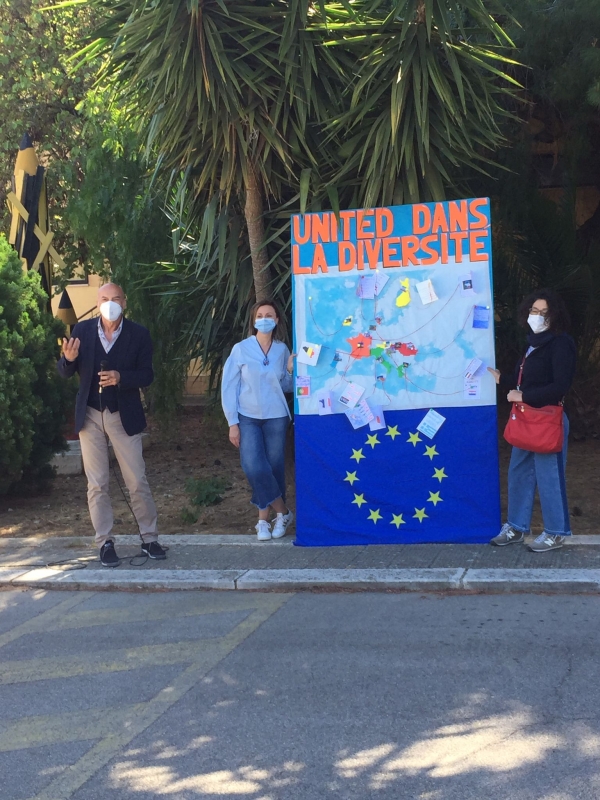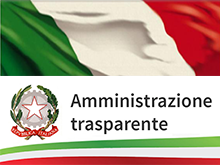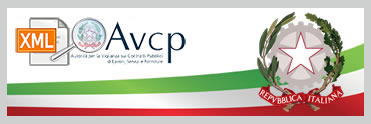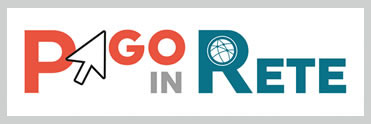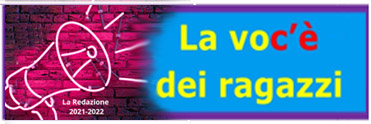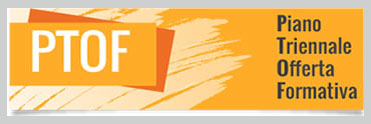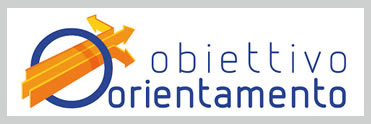|
Celebrazione della Festa dell’Europa all’I.C. Manzoni Poli Il 14 maggio si è celebrata per la prima volta nella nostra scuola la Festa dell’Europa, che ricorre ogni anno il 9 maggio. Lo scopo della Festa è quello di ricordare la “Dichiarazione di Schuman”, un documento considerato come il punto di partenza dell’Unione Europea. La dichiarazione fu rilasciata dal Ministro degli Esteri francese Robert Schuman il 9 maggio del 1950, quando i paesi europei stavano ancora affrontando le conseguenze devastanti della Seconda Guerra Mondiale. La dichiarazione si fondava su due principi fondamentali: la pace e la solidarietà. Il Dipartimento di Lingue della scuola secondaria, insieme alle insegnanti delle quinte classi delle sezioni B e C della scuola primaria hanno organizzato un progetto chiamato “United dans la Diversité” al fine di rafforzare nei nostri studenti la consapevolezza di essere cittadini europei. Il 14 maggio ci siamo riuniti nel cortile della scuola Poli per completare una carta geografica muta dell’Europa con le sagome dei paesi studiati, le loro carte d’identità e le foto dei monumenti più rappresentativi; in seguito abbiamo ascoltato gli studenti della scuola primaria intonare l’inno dell’Europa ed infine gli studenti di terza media hanno letto i loro auguri all’Europa. Tra le altre attività c’è stato un incontro online tra gli studenti delle classi 1^ e 2^ della sezione A della scuola secondaria con una scolaresca maltese. L’incontro è stato possibile grazie agli accordi presi tra il nostro dirigente, prof. Gaetano Ragno e la dirigente Mrs Clarissa Fleri Soler della scuola maltese “St Joseph School” di Sliema, di Malta. Lo scambio culturale è stato organizzato dalle insegnanti della scuola secondaria: Maria Rosaria Lepore, Rosanna Minervini e Antonella Sallustio e dalle colleghe maltesi Mrs Graziella Attard Fabri e Ms. Mary Rose Formosa. I nostri alunni di prima media hanno mostrato le carte d’identità di Malta che hanno elaborato dopo aver studiato il paese, inoltre una studentessa ha esposto in lingua inglese le principali caratteristiche geopolitiche di Malta, attirando l’attenzione e l’approvazione dei coetanei maltesi. Gli studenti maltesi invece hanno letto le loro ricerche sulle principali attrazioni turistiche pugliesi, incantando i nostri studenti con la loro padronanza linguistica in italiano. L’incontro è stato caratterizzato da una grande curiosità espressa da entrambi i lati soprattutto quando c’è stato uno scambio di domande sulla cultura dei rispettivi paesi condotto dagli studenti della classe seconda. I nostri studenti erano interessati a sapere come i loro coetanei vivessero il bilinguismo e volevano anche conoscere quali fossero i posti turistici più belli di Malta. Gli studenti maltesi invece erano curiosi di sapere quali fossero i colori rappresentativi della città di Molfetta e hanno anche voluto soddisfare una grande curiosità sulle nostre abitudini alimentari: se fosse vero che mangiamo il polpo crudo. Come si può ben immaginare, non sono mancati dei momenti divertenti. L’incontro ha rappresentato per gli studenti una grande opportunità per utilizzare la lingua straniera per fini comunicativi in un contesto reale e per avere uno scambio culturale interessante e proficuo, soprattutto in un periodo in cui la pandemia ha causato l’isolamento e l’impossibilità di viaggiare verso mete straniere. |
Celebration of the Europe Day at I.C. Manzoni Poli On 14 May we celebrated for the first time in our school the Eurpe Day. This is a special occasion, which occurs on 9 May. The purpose of this celebration is to remember the “Schuman’s Declaration”, a document considered the foundation of the European Union, which was presented by the French Minister of Foreign Affairs Robert Schuman on 9 May 1950 when the European countries were still facing the devastation brought by the World War II. The declaration was based on two main purposes: peace and solidarity. The Secondary School Department of Modern Languages with the cooperation of the Primary School and in particular the teachers of the B and C courses of the 5th grade, organised a project called “United dans la Diversité” in order to enhance our students’ European awareness. On 14 May we met in the schoolyard of Poli School to complete a map with the shapes of the European Union countries studied, together with their identity cards and the pictures of the most representative monuments; later we listened to the primary school students singing the European anthem, finally our 3rd year students read their wishes to Europe. Among the other activities there was an online meeting between our first and second year students of the A course with Maltese peers. The meeting was possible thanks to the agreement between the principal of our school “I.C. Manzoni Poli”, Prof Gaetano Ragno and Mrs Clarissa Fleri Soler, principal of “St Joseph School” in Sliema, Malta. The cultural exchange was organised by our Secondary School teachers Maria Rosaria Lepore, Rosanna Minervini and Antonella Sallustio and by the Maltese teachers Mrs Graziella Attard Fabri and Ms. Mary Rose Formosa. Our first year students showed their handmade identity cards of Malta and a student described orally the main geographical and political characteristcs of Malta, catching the Maltese peer attention and approvation. The Maltese students read their researches about the most attractive touristic Apulian sites, fascinating our students with their Italian fluency. The meeting was animated by a great curiosity on both sides mainly when there was an exchange of questions about what students wanted to know about their mates culture. On one side, our students were interested in how the Maltese students deal with bilinguism and they wanted to know something about the most attractive places in Malta; on the other side, the Maltese students asked about the representative political colours of Molfetta and about our habit to eat raw octopus. As you can imagine, there was no lack of hilarious moments. The meeting represented for our students a great opportunity to use the foreign language as a real means of communication and to have an interesting and productive cultural exchange, mainly in a period where the pandemic has caused isolation and has forbidden any movement towards foreign countries. |
.jpg)
.jpeg)
.jpeg)
.jpeg)


